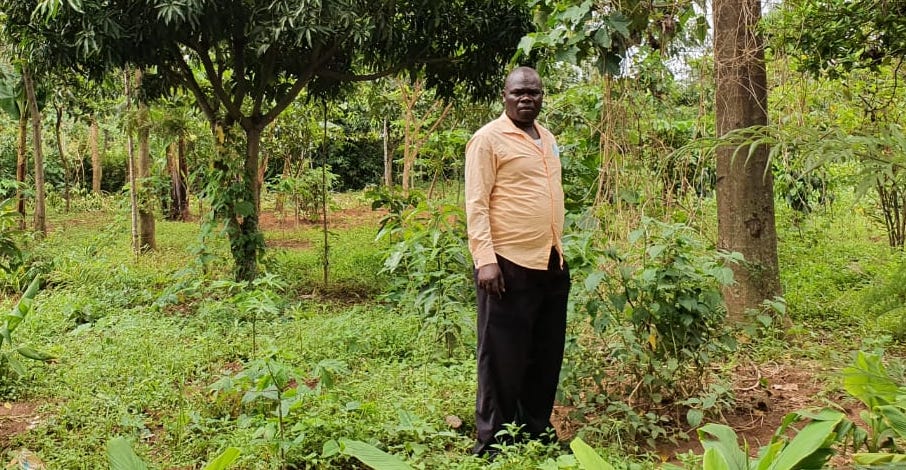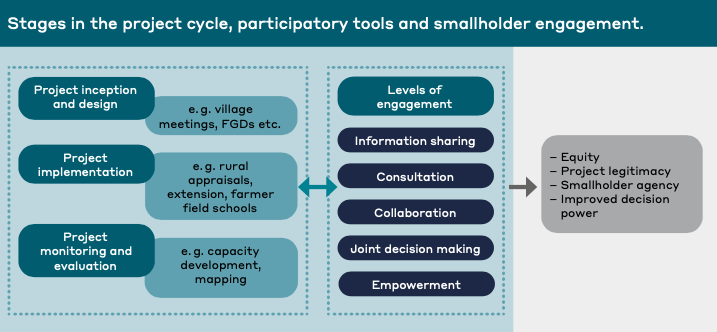Who benefits? SEWOH Lab study explores farmers’ engagement in carbon sequestration schemes
Findings from research on carbon sequestration in agricultural soils
by Bruno St-Jacques | 2021-12-02

The recent COP26 saw nature placed on the agenda more than ever before. Its role to mitigate the impacts of a warming climate and help wildlife, ecosystems, and people adapt and build resilience is now clearly recognised. Today, more than 92 percent of countries’ nationally determined contributions (NDCs) to the Paris Agreement on climate change include measures related to nature.
Soils can play a vital role in mitigation as a store of atmospheric carbon. It is hoped that smallholder farmers can be incentivised to adopt the sustainable land management practices necessary to store greater quantities of carbon by the development of new financial mechanisms. Once the carbon sequestered in the soils is quantified, carbon credits can be issued and sold in the voluntary carbon markets. The revenues from these sales can then be disbursed to farmers. Beyond its mitigation potential (estimated to be between 3.4 and 5 Gt of carbon per year), enhancing soil organic carbon (SOC) content can contribute to the adaptation of agricultural systems to climate change, reverse biodiversity loss, and enhance food security.
Initiatives on soil organic carbon face a number of technical and financial hurdles, including the challenge of monitoring carbon stock changes and issues related to the permanence of carbon in the soils. Efforts are underway to resolve these challenges. Yet there has been comparatively little attention paid to a vital underlying, socially-rooted question: how to effectively involve farmers in such initiatives. How can their legitimate land rights be respected and protected, and how can vulnerable and marginalised communities be engaged? These issues cannot be overlooked as net-zero strategies from governments and the private sector are sure to increase demand for such carbon sequestration initiatives in the near future.
The SEWOH Lab: making SOC projects work for smallholder farmers
Through the SEWOH Lab, we at TMG Research explore ways to link digitalisation with social innovations to contribute to the achievement of SDG 2 (Zero Hunger), and particularly the “leave no-one behind” principle. Our work on soil organic carbon is embedded in this approach. We are working towards creating an enabling environment for smallholder farmers to be adequately rewarded for their restorative activities. We are particularly interested in exploring how digitalisation and digital tools can enhance smallholder farmers’ participation within projects, improve their access to economic opportunities, and help them to overcome barriers to implementation. This is a significant challenge. Tackling it requires closely analysing projects from the perspective of the farmers, exploring how they can benefit from them, and how they can be involved in projects at all stages, from decision-making processes to the actual mechanics of rewarding systems.
Study on farmers’ participation in land-based carbon sequestration projects
Over the past year we have partnered with World Agroforestry (ICRAF) to explore these questions. We identify a tension in the fact that while carbon sequestration projects need to adhere to rigorous monitoring methodologies to be able to issue carbon credits, these methodologies are often quite vague when it comes to the “social” components of implementation, including farmer participation. We therefore investigated the engagement of smallholder farmers in land-based carbon sequestration projects, identified possible barriers to their participation, and proposed solutions to improve their agency and decision-making power within these projects. With agricultural SOC projects still representing a niche pursuit, our investigation expanded to initiatives on afforestation, reforestation and mangrove conservation.
Through a review of project documents and scientific literature, as well as interviews with experts and project leads, we analysed farmers’ levels of engagement during project inception and design, implementation, and monitoring and evaluation (Figure 1).

Figure 1: Stages in the project cycle, participatory tools and smallholder engagement
We identified important variation in participatory processes across the projects surveyed. While some projects did not go beyond information sharing, others deployed an array of participatory tools allowing farmers to effectively take part in decision-making processes. Our research further identified a number of enabling and hindering factors for participation. Our study — which can be read in full here — highlighted the importance of community-based organisations and the central role of land tenure.
Community-based organisations are key enablers of the participation of farmers. They can facilitate clear communication between project proponents and farmers, helping to increase farmers’ bargaining power in negotiations. They can further reduce the operating costs of projects by allowing for participatory monitoring systems that can be more cost-effective. This can be achieved by building on already-existing structures and facilitating the sharing of knowledge and the pooling of financial resources.
Farmer participation is negatively affected by insecure land tenure, as methodologies usually require land titles of a certain length in order to identify beneficiaries of a project. Farmers who lack legal tenure rights therefore run the risk of exclusion. To establish carbon payments, projects may resort to customary norms and practices, facilitated by local organisations, to confer tenure rights and substantiate claims for payment.
Non-carbon co-benefits constitute a main incentive for smallholders’ participation in land-based carbon payment schemes, a research finding which further confirms previous studies. These non-carbon benefits often represent the primary pay-off for farmers and can include improved farm productivity, reduced on-farm degradation, access to financial advisory services and credit, and investments in local infrastructure. With carbon revenues taking time to materialise and amounting to small (albeit non-negligible) sums, non-carbon benefits are crucial as they can allow farmers to offset the opportunity costs of adopting new practices.
Looking ahead
None of the multiple goals which now occupy the world’s attention — food and nutrition security, ecosystem restoration, climate change mitigation and adaptation — can be achieved without adequately considering the interests of those who are doing the work and who are entitled to benefit from it: smallholder farmers. Soil organic carbon sequestration in smallholder farming systems can contribute to all of these goals, but the farmers themselves must be fully involved participants and beneficiaries. While our study identified enabling factors for their enhanced participation, further research is required. More research should be conducted on the potential application of digital tools both for participation and for the reduction of transaction costs across projects. Through our SEWOH Lab project, we are determined to tackle these challenging questions and work towards creating an enabling environment for smallholder farmers to harvest the multiple benefits of locking carbon into soils.
Written by Bruno St-Jacques, TMG Research
Read the joint TMG-ICRAF publication “A review of the participation of smallholder farmers in land-based carbon payment schemes” here.
As part of the “One World — No Hunger” initiative, the SEWOH Lab project is financed by the German Federal Ministry for Economic Cooperation and Development (BMZ).
 Urban Food FuturesFeb 09, 2026
Urban Food FuturesFeb 09, 2026Pushing the horizon: Urban farming and community-led innovation in Mukuru informal settlement
A small community-run greenhouse in Mukuru is offering insights into how controlled-environment agriculture can strengthen food security in urban environments under increasing pressure—and a look into the future of food systems in informal settlements.
Christian Sonntag, Emmanuel Atamba, Lumi Youm
 Land GovernanceDec 18, 2025
Land GovernanceDec 18, 2025Land tenure, women’s land rights, and resilience: Reflections from CRIC23 toward UNCCD COP17
Our experts discuss what the exchanges at CRIC23 highlighted and revealed about the role of secure and gender-equitable land tenure in the UNCCD's work ahead of the 2026 triple COP year.
Frederike Klümper, Washe Kazungu
 Urban Food FuturesDec 09, 2025
Urban Food FuturesDec 09, 2025The story of Mukuru's Urban Nutrition Hub
In Mukuru informal settlement, a safe haven for women has grown into the Urban Nutrition Hub, a multi-purpose space for nutrition education, training, and community development, demonstrating the potential of grassroots community-owned innovation..
Serah Kiragu-Wissler


